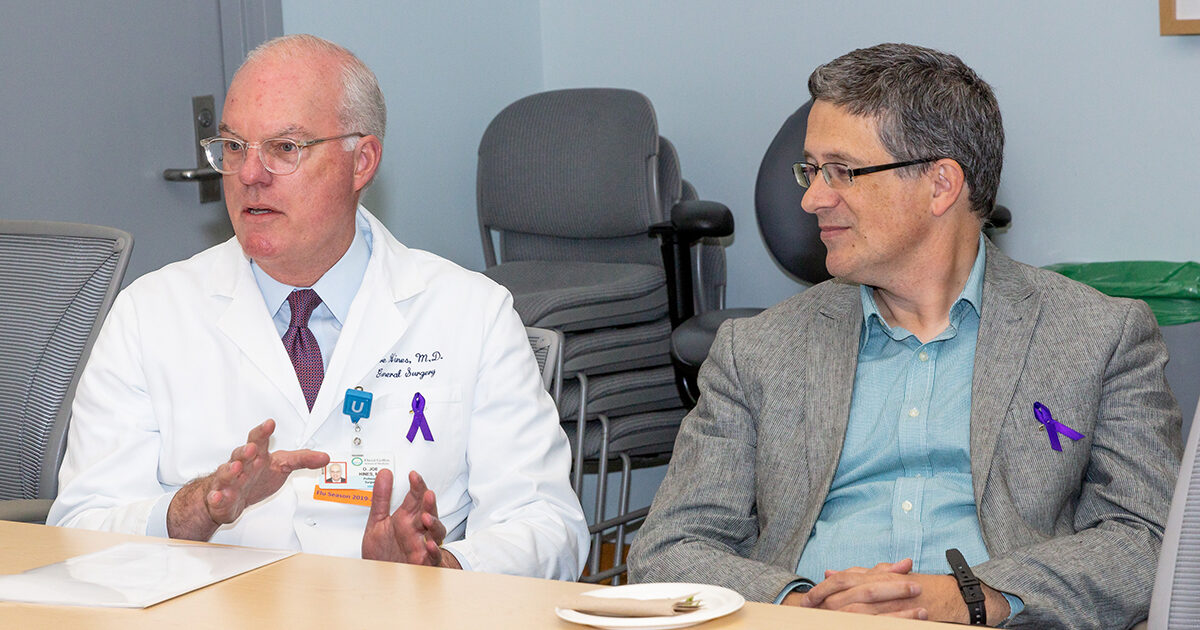The Sahin-Toth Laboratory focuses on hereditary chronic pancreatitis, a major risk factor for pancreatic cancer. Working in collaboration with the Dr. Guido Eibl’s The Ronald S. Hirshberg Translational Pancreatic Cancer Research Laboratory, they seek to better understand how diet, genetics, obesity, and inflammation contribute to pancreatic cancer acceleration.
As Dr. Sahin-Toth wrote in the lab report, “2021 was about re-building the lab after the devastation COVID inflicted on the research community.” With four new researchers in the lab, there is a new energy and enthusiasm which is driving several exciting projects. Despite the altered landscape of research in the COVID era, the Sahin-Toth lab continues to publish in renowned journals, receive NIH funding, and advance our understanding of pancreatic cancer research. The lab faces 2022 with, “strong momentum” and we are hopeful for another productive and successful year to come.
Publications from the Sahin-Toth Laboratory in 2021
1. Defective binding of SPINK1 variants is an uncommon mechanism for impaired trypsin inhibition in chronic pancreatitis. J Biol Chem 2021, 296:100343. PMC7949130
Szabó A, Toldi V, Gazda LD, Demcsák A, Tőzsér J, Sahin-Tóth M.
This biochemical study demonstrated that pancreatitis-associated mutations in the SPINK1 gene rarely alter binding of the trypsin inhibitor to its target, trypsin. Instead, the vast majority of mutations reduce expression of protective SPINK1.
The Journal of Biological Chemistry is the preeminent biochemical journal of the American Society for Biochemistry and Molecular Biology.
2. Mouse model suggests limited role for human mesotrypsin in pancreatitis. Pancreatology 2021, 21:342-352. PMC7969449
Mosztbacher D, Sahin-Tóth M.
This study tested the potential role of mesotrypsin in pancreatitis using a novel genetically modified mouse model. Mesotrypsin is a human digestive protease uniquely resistant to trypsin inhibitors and capable of degrading those. While our findings do not support a significant role for mesotrypsin in pancreatitis, the conclusions further strengthen the already established importance of the other trypsin isoforms.
Pancreatology is the official journal of the International Association of Pancreatology and the European Pancreatic Club.
3. Sentinel acute pancreatitis event increases severity of subsequent episodes in mice. Gastroenterology 2021, 161:1692-1694. PMC8545756
Geisz A, Sahin-Tóth M.
This paradigm-shifting study provided experimental evidence for the SAPE hypothesis which posits that the first episode of acute pancreatitis sensitizes patients for subsequent episodes and progression of their disease.
Gastroenterology is the official journal of the American Gastroenterological Association (AGA) and the most prominent US publication in the gastroenterological sciences.
4. Common calcium-sensing receptor (CASR) gene variants do not modify risk for chronic pancreatitis in a Hungarian cohort. Pancreatology 2021, 21:1305-1310. PMC8663126
Takáts A, Berke G, Szentesi A, Farkas G Jr, Izbéki F, Erőss B, Czakó L, Vincze Á, Hegyi P, Sahin-Tóth M, Hegyi E.
This study resolved the contentious issue whether common variants in the CASR gene increased risk for chronic pancreatitis. Our findings conclusively demonstrated that these gene variants should not be considered risk factors in the clinical setting.
Pancreatology is the official journal of the International Association of Pancreatology and the European Pancreatic Club.
5. Evolutionary expansion of polyaspartate motif in the activation peptide of mouse cationic trypsinogen limits autoactivation and protects against pancreatitis. Am J Physiol Gastrointest Liver Physiol 2021, 321:G719-G734. PMC8668397
Orekhova A, Németh BC, Jancsó Z, Geisz A, Mosztbacher D, Demcsák A, Sahin-Tóth M.
This interesting study utilized protease biochemistry and a new genetically engineered mouse model to demonstrate that mouse cationic trypsinogen evolved features that limit accidental activation and prevent pancreatitis. The findings confirm and extend the notion that unwanted intrapancreatic activity of the digestive protease trypsin plays a central role in pancreatitis development and progression.
The American Journal of Physiology – Gastrointestinal and Liver Physiology is an official journal of the American Physiological Society.
6. Mouse models of trypsin-dependent pancreatitis. Pancreapedia: Exocrine Pancreas Knowledge Base, DOI: 10.3998/panc.2021.11
Sahin-Tóth M.
This contribution reviews novel mouse models designed to understand how intrapancreatic trypsin activity causes pancreatitis and how these mice will be useful for preclinical testing of novel therapies targeting trypsin.
The Pancreapedia is an open-access scientific information repository designed to expedite research on the exocrine pancreas.


